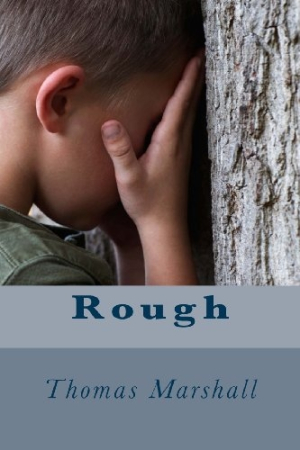
Rough
Thomas Marshall has faced—and triumphed over—seemingly innumerable difficulties in life. He shares them openly, honestly, and humbly in his aptly and simply titled memoir, Rough.
Marshall begins life in the safety and comfort of his grandparents’ home. At age four, he is sent, bewildered, to live with a woman he’s told is his mother, and her husband, whom Marshall refers to throughout the book as “the bear.” Here his life begins a harsh downward turn to physical and verbal abuse. Thomas finds himself the subject of his mother’s contempt—she singles him out in arguments, and she demands he prop his mattress against the tree in the front yard so that everyone can see he wet the bed.
From the start, readers are wrenched by the sadness and loneliness Marshall faces. They root for him page after page through his teen years, his time in the army (which concludes with a less-than-honorable honorable discharge), his transformation in Alcoholics Anonymous, and his quest to find a loving partner and bring about a reconciliation with his family.
Through it all, Marshall’s compassion shines through, even when it seems like it would have been squashed. Readers feel relief alongside Marshall as he finds his niche as a nurse.
The main challenge of this book, as with any look at real life, is that the plot line is messy—resolution doesn’t come as cleanly as in a novel. Though reconciliation with his family comes in some ways, it’s not complete, and it leaves readers still feeling Marshall’s pain and emptiness. The final blow is described at the end of the book when, just after his sixtieth birthday, Marshall finds out that his lover, Jericho, is not who he said he was. Jericho drops out of Marshall’s life after nine years, leaving Marshall to discover that Jericho was only siphoning money from him all along.
Marshall’s unselfconscious honesty and instances of elegant writing are what set this book apart. The first part of the second chapter is particularly poignant; it captures Marshall’s childlike, confused voice as he enters his new house and pieces together who’s who. “I live with a bear. He shares a bedroom with another stranger called mother…My new little brother, Kirk, is here. Unlike the bear, Kirk is sweet, tiny, and easy to break.” Marshall’s broadening understanding of last names and “sharing a bedroom” is both naive and literary. Many chapters jump right into the heart of the matter, keeping readers engaged. For example, the third chapter begins, “I don’t remember the earliest violence.”
A subtitle for the book would give readers a better sense of what it’s about. Also, each chapter begins immediately after the previous one instead of starting on a new page; this keeps readers from getting the deep breath of blank space they’re used to between chapters. And with the length of the volume and the heartbreaking nature of many of the events, that break would be welcome.
Through the memoir, Marshall traces the decades of damage that childhood abuse caused in his life. He wrestles through common themes of faith, sexuality, trust, and vocation—making his story, though unique, relatable to readers.
Reviewed by
Melissa Wuske
Disclosure: This article is not an endorsement, but a review. The publisher of this book provided free copies of the book and paid a small fee to have their book reviewed by a professional reviewer. Foreword Reviews and Clarion Reviews make no guarantee that the publisher will receive a positive review. Foreword Magazine, Inc. is disclosing this in accordance with the Federal Trade Commission’s 16 CFR, Part 255.
